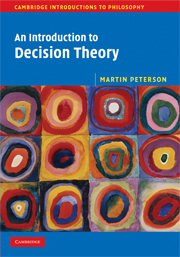Book contents
- Frontmatter
- Contents
- Preface
- 1 Introduction
- 2 The decision matrix
- 3 Decisions under ignorance
- 4 Decisions under risk
- 5 Utility
- 6 The mathematics of probability
- 7 The philosophy of probability
- 8 Why should we accept the preference axioms?
- 9 Causal vs. evidential decision theory
- 10 Bayesian vs. non-Bayesian decision theory
- 11 Game theory I: Basic concepts and zero-sum games
- 12 Game theory II: Nonzero-sum and cooperative games
- 13 Social choice theory
- 14 Overview of descriptive decision theory
- Appendix A Glossary
- Appendix B Proof of the von Neumann–Morgenstern theorem
- Further reading
- Index
7 - The philosophy of probability
- Frontmatter
- Contents
- Preface
- 1 Introduction
- 2 The decision matrix
- 3 Decisions under ignorance
- 4 Decisions under risk
- 5 Utility
- 6 The mathematics of probability
- 7 The philosophy of probability
- 8 Why should we accept the preference axioms?
- 9 Causal vs. evidential decision theory
- 10 Bayesian vs. non-Bayesian decision theory
- 11 Game theory I: Basic concepts and zero-sum games
- 12 Game theory II: Nonzero-sum and cooperative games
- 13 Social choice theory
- 14 Overview of descriptive decision theory
- Appendix A Glossary
- Appendix B Proof of the von Neumann–Morgenstern theorem
- Further reading
- Index
Summary
Philosophers disagree about what probability is. Somewhat roughly put, there are two camps in this debate, objectivists and subjectivists. Objectivists maintain that statements about probability refer to facts in the external world. If you claim that the probability is fifty per cent that the coin I hold in my hand will land heads up when tossed, then you are – according to the objectivist – referring to a property of the external world, such as the physical propensity of the coin to land heads up about every second time it is tossed. From an intuitive point of view, this seems to be a very plausible idea. However, subjectivists disagree with this picture. Subjectivists deny that statements about probability can be understood as claims about the external world. What is, for instance, the probability that your suitor will ask you to marry him? It seems rather pointless to talk about some very complex propensity of that person, or count the number of marriage proposals that other people make, because this does not tell us anything about the probability that you will be faced with a marriage proposal. If it is true that the probability is, say, 1/2 then it is true because of someone's mental state.
According to the subjective view, statements about probability refer to the degree to which the speaker believes something.
- Type
- Chapter
- Information
- An Introduction to Decision Theory , pp. 133 - 163Publisher: Cambridge University PressPrint publication year: 2009



